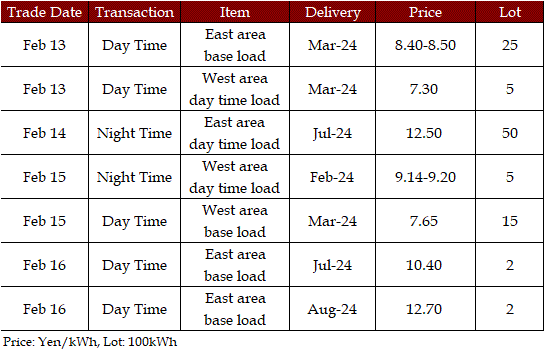|
In the day-ahead market on JEPX (Japan Electric Power Exchange), the 24-hour spot power prices on a weekly average basis for Feb 12-16 delivery dropped steeply from the previous week in both East Japan and West Japan. Amid unabated mild winter, an early arrival of warm spring climate further loosened up already-slack supply-demand fundamentals, boosting downside pressure on spot power prices. On Feb 15, "Haru Ichiban" or the first strong southern wind of the year blew in Kanto, Hokuriku and Shikoku. Haru Ichiban that called the start of a spring season brought the highest temperature in the Tokyo metropolitan area on the same day to 21.1 degrees, a level that is normally seen in late April.
In Tokyo and Kansai, the key areas in East Japan and West Japan, the 24-hour average posted a difference in favor of the East by Yen 2.29 for Feb 12 delivery, Yen 1.26 for Feb 13 delivery, Yen 1.86 for Feb 14 delivery, Yen 0.53 for Feb 15 delivery, and Yen 1.46 for Feb 16 delivery.
In the fuel markets, LNG and coal prices softened from the previous week, but crude oil turned higher.
DES Northeast Asia spot LNG prices hovered in the mid $8 level per mmBtu for prompt March 2024 arrival as of the latter half of the week (Feb 15), down nearly 80cts from the end of the previous week (Feb 9). The market was pushed down further by subdued buying interest from Chinese and South Korean end-users in the Lunar New Year holidays, at a time when warm spring climate loosened up supply-demand fundamentals going forward. The Ministry of Economy, Trade and Industry (METI) announced on Feb 14 that Japan's LNG inventories for power generation stood at 2.06 mil mt as of Feb 11, down 230,000mt from the previous week. The level was below 2.48 mil mt as of end-February last year and the average of past five years at 2.13 mil mt.
FOB Newcastle thermal coal prices in Australia hovered in the high $122 level per ton for April 2024 loading as of the latter half of the week. The level fell by nearly $3 from the end of the previous week, in response to a weakness in gas prices. In addition, the Organization of the Petroleum Exporting Countries (OPEC) in its monthly report released on Feb 13 kept its global oil demand outlook in 2024 but revised down the projection for oil production in 2024 excluding OPEC producers. The report backed up expectations for tightening global supply-demand fundamentals, lending support to crude futures.
In the crude oil market, WTI crude for March 2024 stood in the low $78 level as of afternoon on Feb 16 while Brent crude for April 2024 was trading in the high $82 level. Both WTI and Brent were up about $1.50 from the end of the previous week. Crude prices were underpinned by unabated military tensions in the Middle East.
The actual highest price during the week was at Yen 15.00 in eight areas from Hokkaido to Shikoku as well as the System Price (SP) for Feb 16 delivery. Meanwhile, the actual lowest price during the week was at Yen 0.01 in five areas from Hokuriku to Kyushu as well as SP for Feb 12 delivery, all of nine areas and SP for Feb 13 delivery, Hokkaido and Tohoku for Feb 14 delivery, and Kyushu for Feb 15 delivery.
By area, the weekly average of the 24-hour spot prices was at Yen 8.11 in Hokkaido, down Yen 3.20 from the previous week, Yen 8.12 in Tohoku, down Yen 3.04, Yen 9.07 in Tokyo, down Yen 3.11, Yen 8.84 in Chubu, down Yen 2.12, 8.01 in Hokuriku, down Yen 2.78, Yen 7.79 in Kansai and Chugoku, down Yen 2.71, Yen 7.75 in Shikoku, down Yen 2.68, and Yen 7.42 in Kyushu, down Yen 3.03.
In the JEPX auction, volumes of offers were 1,298.51 mil kWh on a weekly average basis, up 17.2% from the previous week. Meanwhile, bids on a weekly average basis dwindled by 9.6% to 876.09 mil kWh. The weekly average of trade volumes grew by 1.1% to 722.54 mil kWh.
Power demand in nine areas of Japan during Feb 12-16 was a combined 12,390.92 mil kWh, down 12.7% from 14,188.76 mil kWh Feb 5-9. The figure was down 11.7% from the corresponding period a year earlier. Demand during Feb 13-17, 2023 after day of week adjustment was 14,029.80 mil kWh.
In the JEPX forward market, no deals were confirmed during Feb 12-16.
Deals reported on TOCOM (Tokyo Commodity Exchange) during Feb 12-16 were as below.

Deals reported on EEX (European Energy Exchange) during Feb 12-16 were as below.





In the fourth week of February, spot power prices are still believed to have limited upside potential. In the first half of the week, warm spring climate will persist with the highest temperature expected to hover around 20 degrees from southern Tohoku to Kyushu. But the weather is forecast to be gloomy with rain clouds across Japan mostly during the week, a factor that will limit output from photovoltaic generation. Thus, spot prices will likely escape from extreme lows like Yen 0.01 that were occasionally seen during the third week of February.
|
JEPX: System Price (Day Ahead 24 hours)
|
|
Weekday Price
|
12-Feb
|
13-Feb
|
14-Feb
|
15-Feb
|
16-Feb
|
|
24-Hour Ave
|
8.22
|
7.28
|
8.28
|
8.92
|
8.93
|
|
Volume (MWh)
|
693,965
|
735,702
|
735,962
|
719,351
|
727,673
|
|
(unit: yen per kWh) (date: delivery day)
|
|
|

|